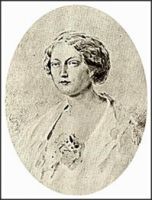Maria Kalergis
We all keep deep in heart the memory of this bright figure. Her life was a continual search for the ideal of goodness and beauty (Ferenz Liszt)
Why I think this woman as an important person:
Maria Kalergis was a great philanthropist and a great lady, always generous to the needy, which at the end of life led her to poverty. She overcame the existing conventionalities. She was extremely intelligent, endowed with an exceptional beauty, she was famous for being the protector of the great artists. She, herself an extremely talented pianist, devoted time, energy and funds to support brilliant artists (including Moniuszko, Wagner, Wieniawski). Adored by the great of his epoch, she knew how to exploit this adoration in a diplomatic way to promote Polish and European culture. She was a citizen of Europe, spoke fluently in six languages. By strange coincidence, her great-grandson Richard Coudenhove-Kalergi founded in 1923 the Paneuropean Union (the forerunner of today's European Union). Highly appreciated at that time but unfortunately completely forgotten today.
Biography
Maria Kalergis was born into a Polish-German family (mother Tekla Nałęcz-Górska, father Frederick Nesselrode,). A year after her birth parents separated due to incompatibility of characters. Discussions and conflicts between the parents left a mark on the psyche of Maria. From the age of six the little girl was brought up by her uncle in St. Petersburg, where she received a good education. At age 16, she has been married to John Kalergis, a rich Greek 25 years older than Maria. In 1840 she gave birth to a daughter- Maria. Nearly one year after the marriage the spouses together announced their separation (Kalergis financially secured his daughter and wife). Using her husband’s citizenship she was able to develop an English passport, which allowed her to freely travel in Europe, entangled in the Crimean Wars. She opened her cultural and patriotic salon in Warsaw (Deotyma writes about it). She has performed publicly on music mornings (the income from this was destined for the poor). An extremely talented pianist (praised by Chopin, whose student she was) she performed with major European artists. Maria had an enormous influence on the development of musical culture in Warsaw. She was responsible for opening of the Institute of Music in Warsaw (later Conservatory) and the Warsaw Music Society (later the Philharmonic). She was a patron of the greatest Polish composer Stanislaw Moniuszko. It was thanks to the intervention of Maria Kalergis that on the 1st of January 1858 the national opera "Halka" was played (which in the period of the partitions was almost a miracle.) She became a fairy godmother to Helena Modrzejewska, enabling her to perform in Warsaw and to start an international career. She was a citizen of Europe and a great diplomat (all the great of the era were her friends, from Napoleon to Bismarck). The second cultural salon she set up in Paris, where it was visited by the great European artists (Chopin, Wagner, Liszt, Rossini, Heine, Gautier, de Musset). Thnaks to her intervention Wagner could play his opera "Tannhäuser" in Paris (it was the beginning of his international career). Great writers have immortalized her on the pages of their worsk, among others: Cyprian Norwid K. (Portrait of a lady), Wlodzimierz Wolski (Black Ribbon), Theophile Gautier (Symphony en Blanc Majer), Alexandre Dumas (Lady with pearls), Heinrich Heine (White elephant). In their works of the great painters (Delacroix, Sanders, Lenbach) paid tribute to her beauty.
Despite the suffering, which was caused by her cancer disease, Maria Kalergis till the end of her life was active. She died 22 May 1874 in Warsaw. In accordance with her wish the funeral was a modest, but despite the early hour crowds arrived to the cemetery of Powązki. The ceremony was a great manifestation of the love and gratitude of Warsaw.
Ferenz Liszt at the news of her death, he composed the first elegy (paid homage in her honor). Europe paid tribute to Maria Kalergis on 17th of June 1875 in Weimar, where at Liszt's initiative funeral ceremony was held in her honor crowned (heads, politicians and great artists arrived).
Bibliography
- Stanisław Szenic, Maria Kalergis, Państwowy Instytut Wydawniczy, Warszawa 1963
Link
- linkhttp://www.youtube.com/watch?v=5lcl5kwUv-g (VIDEO-MARIE KALERGIS (1822 - 1874).wmv (available 28.08.2013)
Picture source
Stanisław Szenic – “Maria Kalergis”-the second edition Warsaw 1963, Publisher: The State Publishing Institute, page 72, Rights: The consent to place photo on the website www.unless-women.eu obtained from the State Publishing Institute in Warsaw




